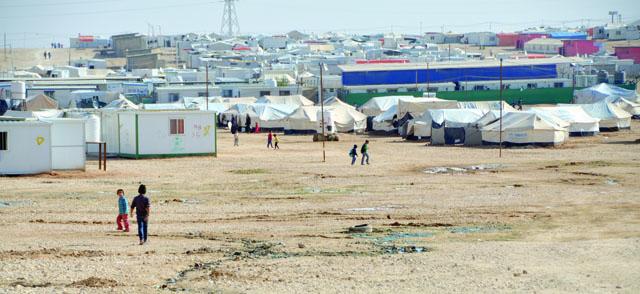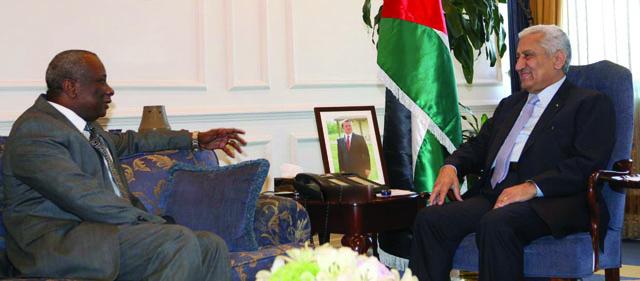You are here
‘New ID cards to be issued for Syrians in Jordan next year’
By Khetam Malkawi - Dec 19,2014 - Last updated at Dec 19,2014

AMMAN — The Syrian refugee influx is not only affecting the Kingdom’s services sector and infrastructure, but also adds pressure on security institutions and the army, a security official said on Thursday.
Brig. Gen. Waddah Hmoud, director of the Syrian Refugee Affairs Department, said the Jordan Armed Forces-Arab Army (JAF) is undertaking additional tasks and duties to respond to the situation.
Since the start of the crisis, JAF personnel have been controlling the 378-kilometre long border with Syria to prevent smuggling attempts and any threat to the country.
In addition, they receive Syrian refugees who come to the Kingdom through 45 entry points, and transport them to the registration point, according to Hmoud.
Maintaining internal security requires more effort with the huge number of Syrians in Jordan, he said, noting that all security departments are intensifying their efforts.
Addressing a workshop on the role of media in the refugee crisis and forced immigration organised by the Interior Ministry and UNHCR, the official highlighted the importance of a database for Syrians, who now constitute 20 to 22 per cent of the Kingdom’s population, as well as other foreigners in the country.
This database, he added, will not only include addresses, but also the background and affiliation of refugees, as border guards cannot guess their political affiliation when they enter Jordan.
Thus, Hmoud announced that all Syrians in the Kingdom, whether or not registered as refugees, will be issued new cards at the country’s 180 police stations starting next month.
Currently, he said, the government is using iris recognition to identify and keep records of Syrians in Jordan.
Hmoud explained that the government issued “service cards” for Syrian refugees last year, but some Syrians forged similar cards one month after the project began.
In addition to these issues, Hmoud said the army and security departments are working to prevent human trafficking involving Syrian refugees, and this is one of the reasons that those who do not have official documents or do not hold Syrian nationality are not allowed in as refugees.
Statistics
Hmoud said 640,000 Syrian refugees have been registered by local authorities and received a “service card from the government”, while 620,000 are registered with the UNHCR.
He explained that official figures recorded by authorities are more accurate as “we register those who enter and leave the country” for security reasons.
Only 98,000 of the registered refugees are staying in camps allocated for Syrian refugees, while the rest reside among host communities.
In addition to this figure, there are 750,000 Syrians living in the Kingdom who are not registered as refugees, which adds up to a total of 1.398 million Syrians in Jordan, according to the official.
Of the total, 52 per cent are 18 years old and under, while 51 per cent are women.
Education
There are 130,000 Syrian students in Jordan, which is placing additional pressure on the Kingdom’s education system, according to Hmoud.
He said the Education Ministry needs 72 new schools to accommodate all Syrian children next year.
Currently, 100 schools operate on the double-shift system, and this number will double next year if no new schools are built to accommodate Syrian students.
However, UNICEF figures indicate that there are another 90,000 school-age Syrian children who are not enrolled in the school system.
Health
In addition to pressure on health facilities and infrastructure, one of the main reasons that prompted the government to stop providing free-of-charge healthcare for Syrians is that Jordanians were complaining that Syrians were paying nothing for these services while they had to, Hmoud said.
He explained that even after this decision the government is still covering 60 per cent of the cost of providing healthcare for Syrians, which totalled JD253 million since the beginning of the year.
According to Hmoud, there is also pressure on the Civil Defence Department, as 3,000 ambulances are sent to and from the Zaatari Refugee Camp alone every month.
Economic impact
Planning Ministry Secretary General Saleh Kharabsheh briefed workshop participants on the economic impact of hosting Syrian refugees.
Noting that donors only contributed $717 million out of the $2.2 billion required to handle the impact of the crisis in 2014, Kharabsheh said the shortage in funds led to problems in host communities.
Related Articles
Jordan’s commitment to its open-door policy for Syrians fleeing the violence in their country should be met with more international support to address the burden of hosting refugees, Prime Minister Abdullah Ensour said Thursday.
Registered Syrian refugees in Jordan now number 618,000, Brig. Gen. Wadah Hmoud, director of the Syrian Refugees Affairs Directorate, said on Thursday.
Marriages among underage Syrian refugees is becoming a problem for authorities due to the fact that many Syrians do not register them, Brig. Gen. Wadah Hmoud, director of the Syrian refugee administration, said on Monday.

















